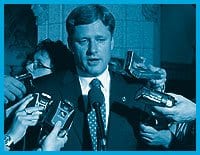Stephen Harper is on the verge of winning the election, which should send chills up and down the spines of all gay folks across the country. While Harper is busy trying to make his extreme social conservatism sound reasonable, his actual words leave much to fear. Some of it may seem like legal gobbledygook but this is some of the most important gobbledygook gay men and lesbians have faced in a long time.
Harper wants to take away almost everything that legally got us to where we are today.
First, he doesn’t support same-sex marriage. Maybe this isn’t so extreme, since until very recently, no politician, including Prime Minister Paul Martin, supported it. But Harper’s strategy is part-icularly involved.
There is a reference currently before the Supreme Court Of Canada in which the government has asked whether its proposed law allowing same-sex marriage, which includes a religious exemption, is constitutional. Harper is going to withdraw the reference. Then he is going to allow a free vote on the traditional definition of marriage. He thinks that the Supreme Court will defer to Parliament, ruling, if a case should come before it, whichever way Parliament voted.
If the Supreme Court doesn’t submit, there’s always the not-withstanding clause. That’s the part of the Constitution that allows Parliament to exempt any of its laws from the Canadian Charter Of Rights And Freedoms. It’s a way of saying, “We don’t care that the courts have said that this law violates charter rights, like equality.” Once a government has used the notwithstanding clause, it has to review the law every five years.
When Harper is pushed on whether he will use the notwithstanding clause to support the traditional definition of marriage, he simply refuses to answer the question directly, saying the courts will just stay out of it.
But the Supreme Court doesn’t just decide to stay out of issues. It hears what is brought before it, by governments or private parties. If the Harper government does pass a new law affirming the traditional definition of marriage, private parties are going to court. Egale Canada is going to court. So are many gay men and lesbians across the country who want to get married.
Assuming that the Supreme Court follows the no-brainer reasoning of the Quebec, Ontario and British Columbia courts of appeal, it will find that the opposite-sex definition of marriage is a blatant and unjustifiable violation of equality rights.
So it’s a question Harper must answer, now or later: Will he use the notwithstanding clause to say that he doesn’t care that the traditional definition of marriage violates the Charter? But he won’t tell us during the election.
Then there is the small matter of the Supreme Court itself, which currently has two vacancies. Martin seems to have neglected to fill them before the end of his term (a mistake a US president would never make). Our theoretical Prime Minister Harper will have two appointments to make, something he’ll be able to do even in the short window of a minority government.
Under Harper, it’s a terrifying prospect. He wants only judges who agree that the court should defer to Parliament, and who don’t interpret the Charter in a broad way.
This is rich because Harper, as head of the National Citizens’ Coalition, went to the Supreme Court to ask it to overturn an election spending bill that was passed by Parliament. The Supreme Court upheld the law in a May decision.
Harper’s actions show that he does want courts to overturn the laws he doesn’t agree with.
In all these positions, Harper hasn’t exhibited much legal finesse. For example, he doesn’t think that the Charter protects against discrimination on the basis of sexual orientation. The Charter doesn’t specifically mention it, so he figures the Supreme Court just made it up. The court has interpreted the Charter to include something called analogous grounds, which prohibits dis-crimination on grounds that are just like the ones mentioned in the Charter, particularly if a group has been historically disadvantaged. It’s not just sexual orientation. It includes citizenship and marital status, too. But Harper zooms in on sexual orientation. For him, it’s just behaviour anyway.
Clarifying this in the televised leaders debate last week, Harper insisted that sexual orientation is not protected in the Charter, but said that he wouldn’t want gay and lesbian people to be fired because of their sexual orientation. We’re supposed to depend on the good will of a Conservative government that says we don’t have any rights? A government that only wants courts to rule in its favour? That’s reassuring.
Harper doesn’t think hate laws should include sexual orientation. According to several of his fellow Conservatives, it may undermine the rights of religious people to discriminate against gay and lesbian people. To paraphrase Conservative candidate Cheryl Gallant: protecting gay men and lesbians may protect paedophiles. Yep, sexual orientation and paedophilia back into the same sentence. It’s the oldest homophobic weapon in the arsenal. This man claims Paul Martin supports child pornography; what will he claim about us?
Harper has been trying to sound moderate by not directly answering questions. But he has said and demonstrated more than enough to make it clear that his vision for gay folks in the new Canada is one that will take us back many, many decades.


 Why you can trust Xtra
Why you can trust Xtra


